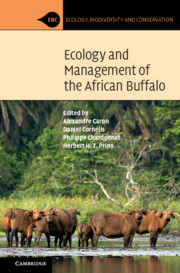Ecology and Management of the African Buffalo
One of iconic Africa’s Big Five, the African buffalo is the largest African bovine or antelope that occurs throughout most of sub-Sahara and in a wide range of ecosystems from savanna to rainforest. The African buffalo is also one of the most successful large African mammals in terms of abundance and biomass. This species thus represents a powerful model to enhance our understanding of African biogeography and wildlife conservation, ecology and management. Edited by four researchers experienced in different aspects of the African buffalo’s biology, this volume provides an exhaustive compilation of knowledge on an emblematic species that stands out as an important component of African natural and human ecosystems. It delivers a global view of the African buffalo and all known aspects of its ecology and management. This book will appeal to students, scholars, scientists and wildlife managers as well as those enthusiastic about the charismatic species. This title is also available as Open Access on Cambridge Core.
Alexandre Caron is a Doctor in Veterinary Medicine and wildlife ecologist specializing in the ecology of infectious disease transmission at the wildlife/livestock interface in the African landscape. For the past 20 years, he has coordinated projects linked to Health Ecology, One Health and Sustainability Science in Southern Africa. He is a permanent researcher at CIRAD (French Agricultural Research Centre for International Development).
Daniel Cornelis is a Senior Ecologist specializing in tropical and subtropical wildlife and ecosystems. Over the past 25 years, he has conducted and coordinated projects and studies on wildlife and natural resource management, including the African buffalo. He is a permanent researcher at CIRAD (Montpellier) and scientific advisor for the Foundation François Sommer (Paris).
Philippe Chardonnet is a Doctor in Veterinary Medicine specializing in tropical animal health and production. He is a co-chair of the IUCN SSC Antelope Specialist Group (ASG) and has over 40 years of experience in wildlife conservation and sustainable use in Africa, Asia, South America and South Pacific. He has co-authored more than 200 publications.
Herbert H. T. Prins is Emeritus Professor of Resource Ecology at Wageningen University and Research (WUR), The Netherlands. He was also a Fulbright Scholar at Princeton University, USA; Foundation Fellow at the Royal Melbourne Institute of Technology, Australia; and Honorary Professor in Computational Ecology at the University of KwaZulu-Natal, South Africa. He has co-authored over 500 publications, co-edited 14 books, and wrote Ecology and Behaviour of African Buffalo (Chapman & Hall, 1996).

